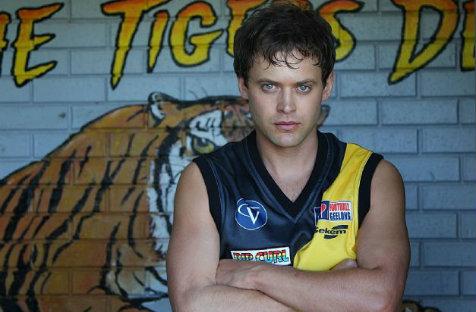Blinder signals its narrative intentions at the outset, with the dual definitions of the titular term overlaid on the opening credits for those unfamiliar with its meaning. From that moment onwards, two facts are apparent: a blistering display of Australian Rules will play out on a football field, and the celebration to end all celebrations will follow. In Richard Gray’s third feature following Summer Coda and Mine Games, both events become inevitable, with Torquay native Tommy Dunn (Oliver Ackland, Wasted on the Young) at the centre of the storm. Yet Blinder is not the feel-good AFL movie that its name insinuates, nor is it the representation of the sport that fans might be expecting.
As a teenager in 2003, Tommy shared the aspirations of many his age, dreaming of playing at the game’s highest level. His team was primed for premiership victory, his status as an emerging talent – with indisputable aptitude, but an inconsistent attitude – was cemented, and AFL scouts were circling. Ten years later, he reflects upon his failed fortunes upon returning home. Reunions with his teammates Morts (Josh Helman, Jack Reacher) and Franky (Angus Sampson, 100 Bloody Acres) provide the troubling backstory.
Blinder delves into the tabloid circus that too often surrounds professional sport, with a scandal involving 15-year-old Sammy (Rose McIver, The Lovely Bones) – the sister of Tommy’s girlfriend Rose (Anna Hutchison, The Cabin in the Woods) – his undoing. Alas, while the intended exploration of unseemly off-field conduct impacting upon burgeoning careers is noble, the presentation proves otherwise, muddied by unsettling sexual politics. Tommy and his teammates are cast as the victims; the women, with the apparent benefit of hindsight, are the purveyors of apologies. The act in question is never condoned, but the perpetrators – as football players – are championed.
The film’s other primary narrative – an underdog team’s endeavour to win at all costs – is all too familiar, and bogged down with visually unspectacular training montages, cliché-ridden yet rousing speeches, and obviously manipulated game day action. The contrast between the celebratory and the sordid only intensifies the disturbing nature of the latter, while the expectation that audiences will cheer for the triumphs of such morally dubious characters makes for constantly uncomfortable viewing.
Plodding plotting, unnecessarily lengthened by the use of flashbacks and hampered by a lack of tension and motivation, does little to improve the feature. The attempted metaphorical use of football’s ups and downs as a reflection of life’s similar vagaries is a stretch, even for seasoned AFL fans. Performances are competent despite the thin material and interminable dialogue, with Jack Thompson’s return to the sport after 1980’s The Club the film’s clear highlight. Alas, Blinder plays in a lesser league in comparison, its heart, hopes and evocation of a game loved by millions irredeemably damaged by its questionable moral stance.
Rating: 2 stars out of 5
Blinder
Director: Richard Gray
Australia, 2013, 118 min
Now showing in cinemas
Distributor: Backlot Studios
Rated M
Actors:
Director:
Format:
Country:
Release:





